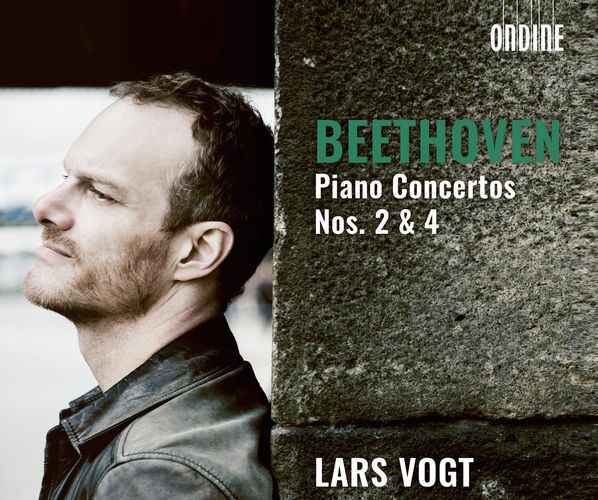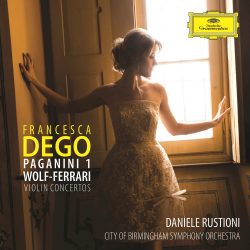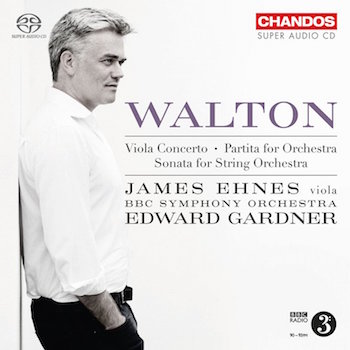Classical CD Reviews: Lars Vogt plays Beethoven, James Ehnes plays Walton, Denis Kozhukhin plays Ravel & Gershwin, Francesca Dego plays Paganini & Wolf-Ferrari
Superb discs from pianist Lars Vogt, violinist Francesca Dego, pianist Denis Kozhukhin, and violinist James Ehnes on the viola.

By Jonathan Blumhofer
One of the fine Beethoven piano concerto cycles of the last few years draws to a close with Lars Vogt’s recordings of the Concerti nos. 2 and 4. The hallmarks of the keyboardist’s earlier installments in this Ondine series – smart tempos; intelligent, elegant playing that brims with personality; etc. – are present here, too.
Vogt draws out the Mozartian debts of the Second Concerto, playing with plenty of tonal weight but never blurring the music’s delicate textures. The result is almost a performance of Mozart’s unwritten 28th concerto – save for all those Beethovenian quirks, like the punchy rhythms of the Rondo that would never have come from Mozart’s pen or, basically, the whole of the second movement. Vogt’s playing is, in the outer movements, full of spirit and rhythmic zest, while the middle one is about as tender and introspective as one could want.
He’s similarly persuasive in the Fourth Concerto, teasing out the first movement’s opening phrase from both piano and orchestra (Vogt conducts the Royal Northern Sinfonia in both concertos): there’s a fresh, improvisational quality to how the introduction is shaped that bodes well for the whole interpretation.
And the first movement lives up to that premonition. This reading packs energy, though it only unleashes its full power judiciously. Those arrivals, like the return of the movement’s opening theme in the recapitulation, are, as a result, thrilling.
The orchestra’s playing in the second movement is tight as a wire, while Vogt responds with soothing warmth. And the finale casts all shadows and doubts to the wind, playful and spirited to the last bar.

There’s no question Francesca Dego is a terrifically gifted violinist. Just listen to the ease with which she plays the daylights out of Nicolo Paganini’s Violin Concerto no. 1 on her new Deutsche Grammophon release. Her technique is flawless, intonation superb, and the excitement of her playing is palpable. But the Paganini is a showpiece: it’s meant to impress without much difficulty. What can she do with meatier fare?
Well, to judge from the current disc, Dego’s just as good – maybe even better – there. The filler (or is it the main focus?) of her new album is Ermanno Wolf-Ferrari’s long-neglected Violin Concerto, and, not only is Dego’s performance of it fervent, but the piece itself is a major discovery.
Written during World War 2, it was done in by both an Allied bomb that destroyed the orchestral parts and the reputation of its dedicatee, a certain Wisconsin-born Guila Bustabo, whose association with the Nazi regime stifled her post-war career. Nevertheless, it’s a beautiful, if somewhat unwieldy score, full of show-stopping writing for the violin, opulent melodies, and vivid orchestrations that deserves to come back in to the repertoire.
The piece seems tailor-made for Dego: thoroughly lyrical and sensuous, and dotted with plenty of virtuosic episodes. She plays them all with warm tone and, in the songful passages (including much of the opening “Fantasia”), sweet intensity. The second-movement “Romance” simply floats, like a feather carried along by a breeze, and the rollicking final rondo, with its long, mid-movement cadenza, gives her instincts as musical poet full rein. Suffice it to say, they’re as irresistible as her violin playing.
The City of Birmingham Symphony Orchestra (CBSO) accompanies her and the orchestra, led by Daniele Rustioni, simply revels in Wolf-Ferrari’s sumptuous scoring. The third-movement “Improvviso” accompaniment is rhythmically taut while the finale overflows with Italianate color and textural clarity.
Bottom line: you simply couldn’t ask for more persuasive advocacy – from soloist, orchestra, or record label – for this piece than you get here. The Paganini’s a nice bonus, but the Wolf-Ferrari’s the main story. And an intoxicating one at that.

This is an understandably safe pairing: the Gershwin and Ravel piano concertos all date from the mid-1920s to early-‘30s and share a certain fascination with jazz, lyricism, and the role of soloist vs. orchestra. Pianist Denis Kozhukhin’s new CD for Pentatone brings the three favorites together again. How does he fare with them?
In a word, well.
Kozhukhin makes charming, spirited work of the Gershwin. Like his expatriate contemporary, Kirill Gerstein, he’s perfectly at home in the music’s blend of concert-hall virtuosity and bluesy soul. His account of the Concerto’s big first movement glitters: in his hands, they keyboard accompaniment to the orchestra playing its lush second theme shimmers like stars over Manhattan. Its muscular bits are played with lots of force but nothing’s unduly heavy.
Kazuki Yamada draws out a reading of the orchestral part from the Orchestre de la Suisse Romande (OSR) that’s bright and brawny. The second-movement trumpet solo swoons nicely (the climax near the end is fiercely played, too) and the finale bounces – a bit roughly, maybe, though with plenty of pep.
The latter quality marks the outer movements of Kozhukhin’s spunky account of the Ravel G-major Concerto: the last movement bristles with joie de vivre while the first grows in strength as it progresses. And the slow one’s plenty warm. Additionally, Kozhukhin’s reading of the Left-hand Concerto is expressively well-judged, noble and nostalgic in just about equal measure.
In both works, Yamada leads the OSR in playing of rhythmic bite and tonal luster. The martial episodes of the Left-hand Concerto really kick, while the orchestra’s brass playing in the G-major subtly emphasizes that work’s indebtedness to (who else?) Gershwin.

If you only know James Ehnes as one of his generation’s great violinists, here’s a terrific chance to hear him as one of its finest violists, too. His performance of William Walton’s Viola Concerto (in its 1962 revision) as part of the latest installment of Edward Gardner’s ongoing Walton series is nothing short of excellent.
Ehnes delivers a performance that’s full of strength and athleticism: he tosses off the scherzo-like second movement with easy brilliance, and the brooding first one sings with plangent feeling. Everything is under control, though: Ehnes’ understanding of the score’s architecture and feel for Walton’s musical language result in a reading of the solo part that pulses with urgency, especially over the bittersweet closing pages.
Gardner leads the BBC Symphony Orchestra (BBCSO) in an accompaniment that’s perfectly attuned to Ehnes’ every whim. But it’s never dry or monochrome; the orchestra’s moments to itself (like the first movement’s climactic outburst) really glow.
Filling out the album are a pair of purely orchestral Walton scores, the Sonata for Strings and Partita. The former is, in fact, an arrangement of Walton’s String Quartet no. 1 (done by the composer and Malcolm Arnold) that, in the present performance, barrels forward with brio: the middle movements, especially – a blistering, nervous Presto and songful Lento – come across powerfully.
The Partita is cut from a more extroverted mold – think of it as a multi-movement, slightly more abstract Scapino Overture. Gardner draws playing of bright-eyed intensity from the BBCSO in its opening movement, knowing cheekiness in the second, and flies through the hurly-burly finale with panache. It’s a superb, exhilarating closer to a Chandos disc that, in just three pieces, makes a compelling case for Walton’s compositional versatility.
Jonathan Blumhofer is a composer and violist who has been active in the greater Boston area since 2004. His music has received numerous awards and been performed by various ensembles, including the American Composers Orchestra, Kiev Philharmonic, Camerata Chicago, Xanthos Ensemble, and Juventas New Music Group. Since receiving his doctorate from Boston University in 2010, Jon has taught at Clark University, Worcester Polytechnic Institute, and online for the University of Phoenix, in addition to writing music criticism for the Worcester Telegram & Gazette.
Tagged: Beethoven, Chandos, Denis Kozhukhin, Deutsche Grammophon, Francesca Dego, James Ehnes, Lars Vogt, Ondine, Paganini & Wolf-Ferrari, Pentatone, Ravel & Gershwin

